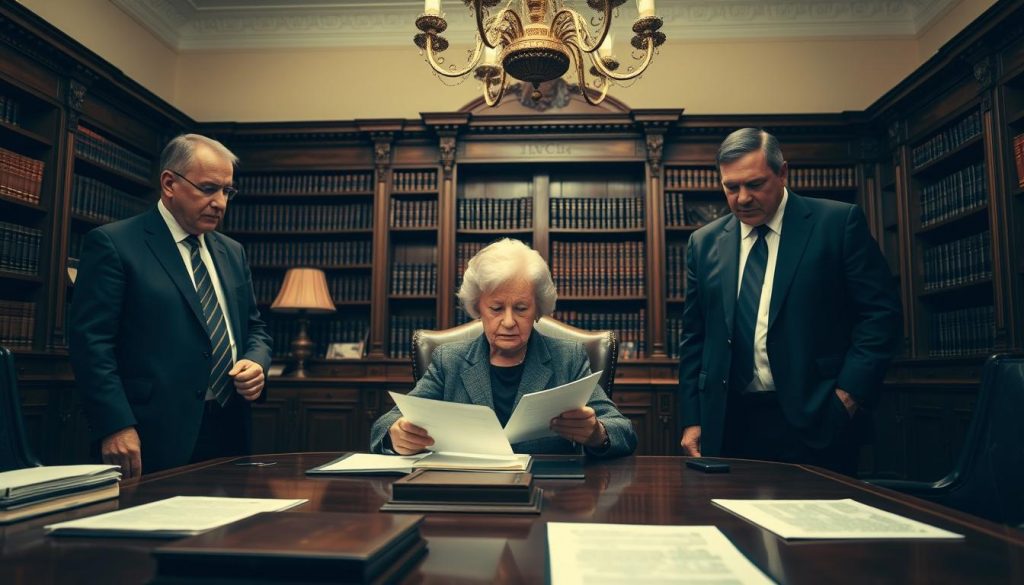Concerned about the impact of a will beneficiary’s death on your estate plan? We understand the importance of securing your family’s assets. An estate plan is a set of documents that outlines your final wishes and can speak for you if you become incapacitated.
When a beneficiary dies, it can significantly impact the distribution of your assets according to your will. We will guide you through the process, exploring the various aspects of beneficiary roles and the implications of their death.
Key Takeaways
- Understanding the implications of a beneficiary’s death on your estate plan
- The importance of reviewing and updating your estate plan regularly
- How to manage the distribution of assets when a beneficiary dies
- The role of beneficiaries in estate planning
- Securing your family’s assets through effective estate planning
Understanding Beneficiary Roles in a Will
Beneficiaries are at the heart of a will, determining who receives what from the estate. Understanding their roles is essential for effective estate planning and ensuring that your assets are distributed according to your wishes.
Definition of a Beneficiary
A beneficiary is a person or organization that receives assets or benefits from a will or trust. Beneficiaries can be individuals, charities, or other entities, and they are the intended recipients of the estate’s assets as outlined in the will.
Types of Beneficiaries
There are primarily two types of beneficiaries: primary and contingent beneficiaries. Primary beneficiaries are the first in line to receive the assets, while contingent beneficiaries receive the assets if the primary beneficiaries predecease the testator. Understanding these roles is crucial for effective estate distribution.
Importance of Beneficiary Designations
Proper beneficiary designations are vital to ensure that your assets are distributed according to your wishes. Incorrect or outdated beneficiary designations can lead to unintended consequences, potentially contradicting the instructions in your will or inheritance laws. Regular reviews and updates of beneficiary designations are essential to reflect any changes in your circumstances or wishes.
By understanding the roles and importance of beneficiaries, you can better plan your estate, ensuring that your loved ones are taken care of as per your intentions. We recommend reviewing your beneficiary designations regularly to align with your current wishes and circumstances.
Implications of a Beneficiary’s Death
If a beneficiary predeceases the testator, their share of the estate may be subject to redistribution. This situation can lead to complexities in the probate process, potentially resulting in outcomes that may not align with the testator’s original intentions. Understanding the implications of a beneficiary’s death is crucial for effective estate planning.
Impact on the Will’s Distribution
The distribution of the estate can be significantly affected if a beneficiary dies before the testator. In such cases, the will’s residuary clause may dictate how the deceased beneficiary’s share is to be distributed. If the will lacks a residuary clause, the estate may be subject to the laws of intestate succession.
| Scenario | Distribution Outcome |
|---|---|
| Beneficiary dies before testator; will has a residuary clause | Share is distributed according to the residuary clause |
| Beneficiary dies before testator; will lacks a residuary clause | Estate is distributed according to intestate succession laws |
Rights of Remaining Beneficiaries
The rights of remaining beneficiaries can be affected by the death of a co-beneficiary. Generally, the remaining beneficiaries may see their share of the estate increase as the deceased beneficiary’s portion is redistributed. However, this can depend on the specific terms of the will and the presence of any substitute beneficiaries.
Remaining beneficiaries should be aware of their legal rights and the potential for disputes arising from the redistribution of the deceased beneficiary’s share. It is advisable for beneficiaries to seek legal counsel to understand their position and options.

Legal Consequences to Consider
The death of a beneficiary can trigger various legal consequences, including potential disputes among beneficiaries and challenges to the will. It is essential to consider these implications when planning your estate to minimize the risk of future conflicts.
- Review and update your will regularly to reflect changes in your circumstances and the status of your beneficiaries.
- Consider including substitute beneficiaries to avoid the application of intestate succession laws.
- Seek professional legal advice to navigate the complexities of estate planning and beneficiary designations.
Revoking a Will After a Beneficiary’s Death
Upon the death of a beneficiary, revoking the current will might be the best course of action to reflect the changed circumstances and ensure that the estate is distributed according to the testator’s updated wishes.
Revoking a will is a significant step, and understanding the process is crucial for effective estate management. We will guide you through the necessary steps and considerations involved in revoking a will after a beneficiary’s death.
Process for Revocation
The process for revoking a will involves several key steps:
- Reviewing the existing will to understand the current beneficiary designations and the testator’s intentions.
- Determining the legal requirements for revoking a will in your jurisdiction, which may involve creating a new will or a codicil.
- Executing the revocation by creating a new will that explicitly revokes the previous one.
It’s essential to follow the legal formalities to ensure that the revocation is valid and recognized by the courts.
When a New Will is Necessary
A new will is necessary when the changes to the beneficiary designations are significant or when the testator’s circumstances have changed substantially. This could include changes in family dynamics, financial status, or other relevant factors.
Creating a new will allows the testator to:
- Update beneficiary designations to reflect the current wishes.
- Include contingent beneficiaries to ensure that the estate is distributed as intended.
- Address any other changes in the estate settlement process.
Important Considerations for Executors
Executors play a crucial role in managing the estate settlement process, especially when a will is revoked. They must:
- Understand the testator’s intentions and the legal requirements for estate administration.
- Communicate effectively with beneficiaries and other stakeholders.
- Ensure that the estate is administered in accordance with the new will or updated estate plan.
Executors must be diligent and proactive in managing the estate to avoid disputes and ensure a smooth settlement process.
Alternate Beneficiaries: What You Need to Know
Naming alternate beneficiaries is a vital step in ensuring your assets are distributed according to your wishes. This process involves understanding the role of substitute beneficiaries and how to designate them effectively in your will.
Role of Substitute Beneficiaries
Substitute or contingent beneficiaries are individuals or entities who will receive your assets if your primary beneficiaries predecease you. This ensures that your estate is handled as you intended, even if unforeseen circumstances occur. Designating alternate beneficiaries provides an additional layer of security for your estate plan.
For instance, if you have named your spouse as a primary beneficiary and your children as secondary beneficiaries, should your spouse pass away before you, your children will inherit your assets. This hierarchical structure helps in maintaining the integrity of your estate plans.
How to Designate Alternate Beneficiaries
Designating alternate beneficiaries is a straightforward process that involves specifying their names in your will or other relevant estate planning documents. It’s essential to be clear and precise when naming alternates to avoid any confusion or disputes. Consulting with a legal professional can help ensure that your wishes are accurately reflected in your documents.
- Identify who you want as your alternate beneficiaries.
- Clearly state their names and relationships to you in your will.
- Ensure that your executors and trustees are aware of your decisions.
Updating Your Will Accordingly
Once you have designated alternate beneficiaries, it’s crucial to review and update your will periodically. Life changes such as marriages, divorces, births, or deaths can impact your beneficiary designations. Regular updates ensure that your estate plan remains aligned with your current wishes.
For example, if you have named a friend as an alternate beneficiary and they pass away, you will need to update your will to reflect this change. Failing to do so could result in unintended consequences for your estate.
By understanding the importance of alternate beneficiaries and keeping your will up-to-date, you can have peace of mind knowing that your estate will be distributed according to your wishes, even in unexpected circumstances.
Special Situations: Joint Tenants and Trusts
Joint tenancy and trusts are two significant estate planning tools that can greatly impact how your assets are distributed after your death. Understanding these concepts is essential for effective estate planning.
Joint Tenancy Explained
Joint tenancy is a form of co-ownership where two or more individuals own a property together, with the right of survivorship. This means that when one joint tenant dies, their share automatically passes to the remaining joint tenants, bypassing the will and probate process. It’s a straightforward way to transfer ownership without the need for probate, but it can have implications for estate planning, particularly if the deceased’s share was intended for other beneficiaries.
For instance, if you own a property as joint tenants with your spouse, and you die, your spouse will automatically inherit your share. However, if you have children from a previous marriage, they might not receive the share you intended for them. It’s crucial to consider the implications of joint tenancy on your overall estate plan.

Trusts as Beneficiaries
Trusts can be used as beneficiaries in estate planning, offering a flexible way to manage and distribute assets according to your wishes. By naming a trust as a beneficiary, you can ensure that the assets are distributed for the benefit of specific individuals or causes, while also potentially reducing tax liabilities and avoiding probate.
For example, you might set up a trust for your grandchildren’s education, naming the trust as a beneficiary of your life insurance policy or retirement account. This way, you can ensure that the funds are used for their intended purpose, even if your grandchildren are minors when you pass away.
To learn more about how trusts can be used in estate planning, you can visit MPEstate Planning for detailed guidance.
Handling Death of a Joint Tenant
When a joint tenant dies, their share automatically passes to the remaining joint tenants due to the right of survivorship. However, this can sometimes lead to unintended consequences, especially if the deceased had intended to leave their share to other beneficiaries.
To mitigate such issues, it’s essential to review and update your estate plan regularly, taking into account any changes in your joint tenancy arrangements. This might involve severing the joint tenancy and converting it to a tenancy in common, which allows each owner to leave their share to different beneficiaries in their will.
By understanding the implications of joint tenancy and trusts, you can make informed decisions about your estate plan, ensuring that your assets are distributed according to your wishes. We recommend consulting with an estate planning professional to navigate these complex issues and create a plan that best suits your needs.
Seeking Legal Advice on Wills
Estate planning involves more than just drafting a will; it requires careful consideration and expert legal advice to ensure your wishes are respected. When dealing with the complexities of wills and estate distribution, understanding your legal rights and the potential for estate disputes is crucial.
When to Consult a Solicitor
Consulting a solicitor is advisable when you are unsure about any aspect of your will or estate planning. This includes situations where you have complex family dynamics, significant assets, or specific wishes regarding the distribution of your estate. A solicitor can provide solicitor guidance on how to navigate these complexities and ensure that your will is valid and effective.
Some scenarios where seeking legal advice is particularly important include:
- When you have minor children or dependents.
- If you have assets in multiple jurisdictions.
- When there are potential disputes among beneficiaries.
- In cases where you wish to make significant changes to your existing will.
Benefits of Professional Guidance
Professional legal guidance offers numerous benefits, including:
- Ensuring that your will is legally binding and executed according to your wishes.
- Providing clarity on your legal rights and the rights of your beneficiaries.
- Helping to mitigate potential estate disputes among family members or other beneficiaries.
- Offering strategies for tax-efficient estate planning.
By seeking the advice of a solicitor, you can have peace of mind knowing that your estate is being handled competently and in accordance with your intentions.
Finding the Right Legal Support
When looking for legal support, it’s essential to find a solicitor who specializes in wills and estate planning. Consider the following factors:
| Criteria | Description |
|---|---|
| Experience | Look for solicitors with a proven track record in handling wills and estate planning. |
| Specialization | Ensure the solicitor specializes in the area of law relevant to your needs. |
| Reputation | Check reviews and testimonials to gauge the solicitor’s reputation and client satisfaction. |
By carefully selecting a solicitor, you can ensure that you receive the best possible guidance for your estate planning needs.

Addressing Family Dynamics and Conflicts
The death of a beneficiary can trigger a range of emotions and conflicts within a family, complicating the estate settlement process. As experienced professionals, we understand the importance of managing these dynamics to ensure that the testator’s wishes are respected and that the estate is distributed fairly.
Common Disputes Among Beneficiaries
Disputes among beneficiaries can arise from various sources, including misunderstandings about the will, perceived inequalities in distribution, or conflicts between family members. For instance, if one beneficiary feels that they have been treated unfairly compared to others, it can lead to tension and disputes.
- Disagreements over asset distribution
- Conflicts between family members with different expectations
- Challenges to the validity of the will
Addressing these disputes requires a combination of clear communication, empathy, and, if necessary, professional mediation. We recommend that families seek legal guidance to navigate these complex issues effectively.
Mediation and Conflict Resolution
Mediation can be a highly effective way to resolve beneficiary conflicts without resorting to costly and time-consuming legal battles. A neutral third-party mediator can facilitate discussions, helping parties to reach a mutually acceptable agreement.
For more information on resolving family inheritance disputes, you can visit Giambronelaw’s guide on resolving family inheritance.
| Conflict Resolution Method | Description | Benefits |
|---|---|---|
| Mediation | A neutral third party facilitates a discussion to reach a mutual agreement. | Cost-effective, preserves family relationships |
| Negotiation | Direct discussion between parties to resolve disputes. | Flexible, allows for creative solutions |
| Litigation | A legal process where a court makes a binding decision. | Binding decision, can provide clarity |
Importance of Open Communication
Open communication is crucial in preventing and resolving estate disputes. By keeping beneficiaries informed about the estate settlement process and addressing concerns promptly, executors can reduce the likelihood of conflicts.
We emphasize the importance of transparency and clear communication in managing beneficiary expectations and minimizing potential disputes. By adopting a proactive and empathetic approach, families can navigate the challenges of estate settlement more effectively.
The Role of Executors in Managing Changes
After a beneficiary’s death, executors must navigate the legal and administrative changes required to ensure that the estate is administered according to the testator’s wishes.
Executor Responsibilities After a Death
Executors are responsible for administering the estate according to the will, which includes managing assets, paying debts, and distributing the remaining assets to the beneficiaries. When a beneficiary dies, the executor’s role becomes even more complex, as they must adjust the distribution according to the will’s specifications or the law.
Key Responsibilities:
- Managing and distributing assets according to the will
- Communicating changes to the beneficiaries
- Ensuring compliance with legal requirements
Communicating Changes to Beneficiaries
Effective communication is crucial when changes occur due to a beneficiary’s death. Executors must inform the remaining beneficiaries about the adjustments in the estate distribution and the reasoning behind these changes.
Best Practices for Communication:
- Be transparent about the changes and the legal basis for them
- Provide timely updates to avoid confusion or disputes
- Be available to answer questions and provide clarification
Ensuring Legal Compliance
Executors must ensure that all actions taken regarding the estate are in compliance with the law. This includes understanding the legal implications of a beneficiary’s death on the will and the estate’s distribution.
Legal Compliance Steps:
- Review the will and understand its provisions regarding beneficiary deaths
- Consult with legal professionals if necessary to ensure compliance
- Document all actions taken regarding the estate administration
Planning for the Future: Revising Your Will
As we have discussed, estate planning is an ongoing process that requires regular attention to ensure it remains aligned with your current wishes and circumstances. Regularly reviewing and updating your will is crucial for reflecting changes in your life, assets, and wishes.
Regular Reviews
Updating your will is essential to ensure that your estate is distributed according to your current intentions. We recommend reviewing your will every few years or whenever significant life changes occur, such as marriage, divorce, or the birth of a child. For more information on updating your estate plan, you can visit MP Estate Planning.
Managing Life Changes
Life changes, such as moving to a new home or acquiring new assets, can impact your will. It’s essential to assess how these changes affect your estate planning strategies and make necessary adjustments.
Best Practices
To manage your will effectively, keep your documents organized, and ensure that your executors and beneficiaries are aware of their roles and responsibilities. By following these best practices, you can ensure that your will updates are handled efficiently.


